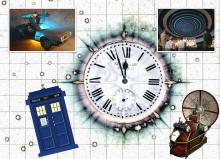Listen to today's episode of StarDate on the web the same day it airs in high-quality streaming audio without any extra ads or announcements. Choose a $8 one-month pass, or listen every day for a year for just $30.
You are here
Falling Back
If you find yourself feeling down over the next few days, it could be caused by the Sun — or the lack of the Sun. That’s because we “fall back” tonight as Daylight Saving Time comes to an end. The Sun will set an hour earlier on our clocks, so we’ll see less evening sunlight. And that could lead to more episodes of depression.
The United States has been using Daylight Saving Time off and on since World War I. Currently, we “spring forward” on the second Sunday of March, and fall back on the first Sunday of November.
The practice has been controversial from the start. Only in the last couple of decades, though, have researchers really probed its effect on human health.
There are good indications that the spring transition — where we lose an hour of sleep — causes problems. Several studies have found a jump in the number of heart attacks, for example. A 2009 study found an increase in the number and severity of injuries among mine workers. And a study in Australia found a jump in the number of male suicides.
“Falling back” seems to cause fewer physical problems, although a Swedish study found jumps in the number of strokes after both spring and fall transitions. But a study in Denmark found that the fall change brings a spike in the number of hospital visits for depression — perhaps as a result of seeing less sunlight in the evening. So experts recommend getting out in the sunlight over the next few days to help adjust to the changing clocks.
Script by Damond Benningfield





